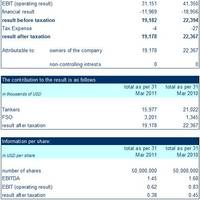Euronav Q1 2011 Results

The executive committee of Euronav NV (NYSE EURONEXT: EURN) reported its preliminary financial results for the three months ended 31st March 2011. For the first quarter 2011, the company had a net income of USD 19.2 million or USD 0.38 per share (first quarter 2010: USD 22.3 million and USD 0.45 per share). EBITDA for the same period was USD 72.7 million (first quarter 2010: USD 84.2 million). The result is affected positively by the revaluation at marked-to-market levels of non cash items such as hedge instruments on interest rates and rate of exchange for a total of USD 5.2 million.
Oil Markets Adjust to Japan’s Disaster
Singapore, 16 March — The 11 March earthquake and tsunami in Japan, and the continuing nuclear crisis that they triggered, will have significant repercussions in global energy markets, according to international energy price reporting agency Argus. Japan will rely more on oil for power generation at least until the end of this year, altering regional balances for some grades of crude and providing a large boost in demand for low-sulphur fuel oil (LSFO). And it will seek additional LNG supplies. The quake and tsunami knocked nuclear plants with 11GW of generating capacity off line, and another 1.1GW nuclear plant was shut for maintenance at the time, leaving 25pc of Japan's nuclear capacity shut after the disaster.
IEA Releases New Publication
“There is an urgent need to consider ways to accelerate the decoupling of energy and CO2 emissions from economic growth,” said Claude Mandil, Executive Director of the International Energy Agency (IEA) at the launch in Brussels of Oil Crises and Climate Challenges: 30 Years of Energy Use in IEA Countries. This new publication examines how energy efficiency and factors such as economic structure, income, lifestyle, climate, prices and fuel mix have shaped developments in energy use and CO2 emissions in IEA countries since the organization was founded 30 years ago. It looks at developments sector-by-sector in detail and provides energy policy-makers with data and insights that will help them find ways to use energy efficiency and lower-carbon fuels to achieve a more sustainable future.





